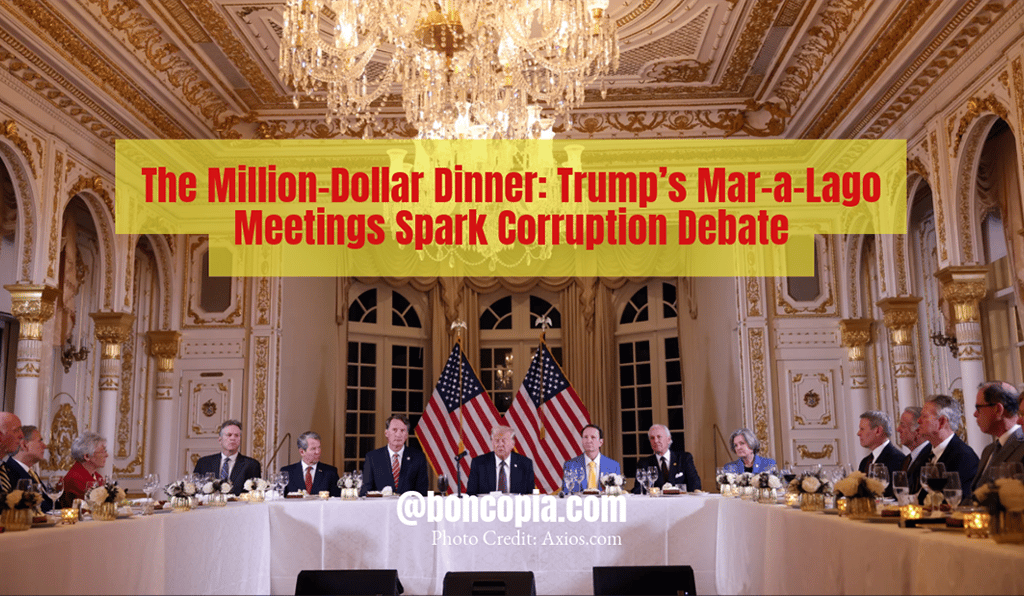The Million-Dollar Dinner: Trump’s Mar-a-Lago Meetings Spark Corruption Debate
5/7/20254 min read


The Million-Dollar Dinner: Trump’s Mar-a-Lago Meetings Spark Corruption Debate
Published on Boncopia.com | May 6, 2025
A Pricey Seat at the Table
Imagine paying $1 million for a dinner or $5 million for a one-on-one chat. That’s the reported cost of access to former President Donald Trump at his Mar-a-Lago estate in Florida, according to a March 2025 WIRED report. The news, first shared on X by user @Suzierizzo1, has ignited a firestorm of debate: Is this a blatant pay-to-play scheme, or just politics as usual? Let’s dive into the controversy, the history, and what it means for democracy.
What’s Happening at Mar-a-Lago?
The WIRED article revealed that business leaders are shelling out millions for exclusive access to Trump at his Palm Beach compound. A group dinner with the former president costs $1 million per person, while a private meeting runs a staggering $5 million. Sources describe these one-on-one sessions as a “hot ticket” in the business community, with high-profile figures like Elon Musk spotted at related Mar-a-Lago events.
On X,@Suzierizzo1 called the practice “corrupt AF,” arguing that if a Democrat did this, the backlash would be deafening. The post, which included a TikTok video of a congressional speech captioned “THIS IS MAYBE SECOND,” struck a nerve, racking up replies that both condemned and defended Trump’s actions.
A Familiar Playbook?
The Mar-a-Lago meetings aren’t a new concept in politics—they echo past controversies. During the 1990s, President Bill Clinton faced scrutiny for the Lincoln Bedroom scandal, where donors who gave large sums to the Democratic Party were allegedly rewarded with overnight stays at the White House. A 1997 CNN report noted that 938 people stayed in the Lincoln Bedroom from 1995-96, with those guests donating $5.4 million to the DNC. One X user, @Crey1959, pointed out this parallel, asking if people had forgotten Clinton’s actions.
Similarly,
@ChrisCoolyardnreferenced Hunter Biden’s art sales, which critics have called a potential avenue for influence peddling. Data from OpenSecrets reinforces that high-dollar fundraisers are standard across parties: the 2020 election cycle saw $14 billion raised, much of it through exclusive events where donors pay for access to politicians. Nancy Pelosi, for instance, has charged $50,000 to $200,000 for similar engagements, as noted by @Electro_Couture on X.
The Pay-to-Play Debate
At the heart of this controversy is the concept of “pay-to-play”—the idea that political access and influence can be bought. Public Citizen has long criticized such practices, noting that while bribery in government contracts is illegal, few states restrict campaign contributions from businesses seeking those contracts. This creates a loophole where money can sway decisions, often at the expense of fairness.
The Brennan Center for Justice highlights how the 2010 Citizens United Supreme Court decision amplified the role of big money in politics, tilting influence toward wealthy donors and corporations. In 2020 alone, the top 100 donors accounted for 20% of all federal campaign contributions, per OpenSecrets data. Critics argue that Trump’s Mar-a-Lago meetings take this to a new level, commodifying access in a way that feels particularly brazen.
Both Sides of the X Debate
The X thread reveals a polarized response. Some users, like @RichardAngwin, agree with @Suzierizzo1, calling the Mar-a-Lago scheme a “new low” for Trump. Others, like @jewelswill, argue that the Clintons have done similar things for years, questioning the outrage’s consistency.@stockcommgroup provided a more neutral take, noting that political donation dinners are a longstanding practice across both major U.S. parties, often criticized for giving wealthy donors disproportionate influence.
One user,@Electro_Couture, even shared a meme of “Trump Derangement Syndrome Pills,” suggesting that critics are overreacting due to bias. Meanwhile, @LadyLongToes23 questioned the story’s validity, arguing that if it were true, Trump would already face impeachment proceedings.
Why It Matters
The Mar-a-Lago controversy underscores a deeper issue in American politics: the growing influence of money. As Don Moynihan, a public policy professor at the University of Michigan, told WIRED, “The concern is less about fundraising and more about access and influence.” When access to leaders comes with a multimillion-dollar price tag, it raises questions about who really shapes policy—and whether the average citizen’s voice is being drowned out.
The Federal Election Commission reported that over $14 billion was raised in the 2020 election cycle, with much of it coming from high-dollar donors. This trend, combined with lax transparency laws, fuels skepticism about the democratic process. The Brennan Center advocates for reforms like the DISCLOSE Act, which would require groups engaged in political spending to reveal their donors, aiming to curb “dark money” influence.
What’s Next?
Trump’s Mar-a-Lago meetings may be legal, but they’re reigniting calls for campaign finance reform. Public Citizen has pushed for stricter pay-to-play laws, while advocates argue for public financing of elections to level the playing field. Yet, with political fundraisers deeply entrenched in both parties, change won’t come easily.
As this debate unfolds, it’s worth reflecting on the state of democracy. Are we okay with a system where access to leaders is sold to the highest bidder? Or is it time to rethink how we fund and govern our political proce
Let’s Talk About It
What do you think: Are Trump’s Mar-a-Lago meetings a new low, or just politics as usual?
Should there be stricter limits on how much donors can pay for access to politicians?
How can we ensure that everyday citizens, not just millionaires, have a say in democracy?
We’d love to hear your thoughts in the comments below.
hello@boncopia.com
+13286036419
© 2025. All rights reserved.